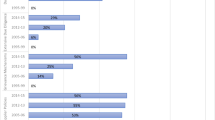Abstract
This paper discusses the economic impact and political consequences of ethical investing, with particular attention to the case of South Africa. The origins of ethical investing are examined, along with the institutions and strategies by which ethical investing operates today. Of immediate relevance to managers is a recent judicial decision upholding Baltimore's divestment ordinance. The discussion concludes with an assessment of the likely consequences of ethical investing for U.S. multinationals in Southern Africa.
Similar content being viewed by others
References
Alinsky, S. D.: 1971, Rules for Radicals (Random House, N.Y.).
Bachrach, P.: 1967, The Theory of Democratic Elitism: A Critique (Little, Brown, & Company, Boston).
Barrett, P. M.: 1986, August 5, ‘Doing Good and Doing All Right: Investors Applying Ethical Values’, The Wall Street Journal.
Berle, A. A. and G.C. Means: 1932, The Modern Corporation and Private Property (The Macmillan Company, N.Y.).
Berman, P.: 1985, September 16 & 23, ‘The Politics of Hip’, The New Republic, 33–39.
Domini, A. L. and P. D. Kinder: 1984, Ethical Investing (Addison-Wesley, Reading, Mass.), p. 194.
Drucker, P. F.: 1976, The Unseen Revolution: How Pension Fund Socialism Came to America (Harper and Row, N.Y.).
Galbraith, J. K.: 1952, American Capitalism: The Concept of Countervailing Powers (The Riverside Press, Cambridge, Mass.).
Heard, J. E.: 1987, ‘Pension Funds and Contests for Corporate Control’, California Management Review 29(2), 89–100.
Innes, D.: 1987, March 13–19, ‘A Sudden Interest in Monopolies’, Weekly Mail, p. 17.
Jenkins, C.: 1986, The Economic Implications of Disinvestment for South Africa (The South African Institute of International Affairs, Johannesburg, South Africa).
Lowi, T.: 1967, ‘The Public Philosophy: Interest-Group Liberalism’, American Political Science Review 61, 5–24.
Lydenberg, S. D., A. T. Martin, S. O. Strub, and the Council on Economic Priorities: 1986, Rating America's Corporate Conscience (Addison-Wesley, Reading, Mass.).
Paul, K.: 1986, Spring, ‘The Inadequacy of Sullivan Reporting’, Business and Society Review 57, 61–65.
Ring, T.: 1986, March 9, ‘S.A.-free Portfolios Down in ‘86’, Pensions and Investment Age, p. 20.
Sampson, A.: 1987, Black and Gold: Tycoons, Revolutionaries, and Apartheid (Pantheon, N.Y.).
Savage, M.: 1986, ‘The Cost of Apartheid’, in New Series # 121 (University of Cape Town, Cape Town, South Africa).
Sethi, S. P.: 1970, Business Corporations and the Black Man: An Analysis of Social Conflict — The Kodak FIGHT Controversy (Harper and Row, N.Y.).
Sethi, S. P.: 1986, ‘South Africa Beyond Apartheid’, Working Paper # SR-86-02 (Baruch College, Center for Management Development and Organization Research, N.Y.).
Simon, J., C. W. Powers, and J. P. Gunnemann: 1972, The Ethical Investor (Yale University Press, New Haven, Conn.).
Talner, L.: 1983, The Origins of Shareholder Activism (Investor Responsibility Research Center, Washington, D.C.).
Valentine, P. W.: 1987, July 18, ‘Baltimore Divestiture Law Upheld’, The Washington Post.
Vogel, D.: 1978, Lobbying the Corporation: Citizen Challenge to Business Authority (Basic Books, N.Y.).
Author information
Authors and Affiliations
Additional information
Dr. Paul is an Associate Professor of Management at the Rochester Institute of Technology. She took her Ph.D. from Emory University in 1974. She has published and presented widely on the subject of Business Ethics and Business and Public Policy. Her current research interest in business and South Africa has taken her to South Africa on a Fulbright Fellowship. Dr. Paul has also been named a Radcliffe Peace Fellow for 1987–88. She has just edited Business Environment and Business Ethics: The Social, Moral, and Political Dimensions of Management (1987) for Ballinger Press.
Mr. Aquila has been a full time Lecturer at the Rochester Institute of Technology since 1984. He took his M.B.A. degree from New York University in 1980 and is just finishing his Ph.D. at the University of Rochester in American History. Mr. Aquila was awarded the David Parker Memorial Prize in History from the University of Rochester in 1986.
Rights and permissions
About this article
Cite this article
Paul, K., Aquila, D.A. Political consequences of ethical investing: The case of South Africa. J Bus Ethics 7, 691–697 (1988). https://doi.org/10.1007/BF00382979
Issue Date:
DOI: https://doi.org/10.1007/BF00382979




